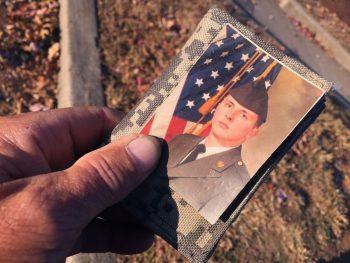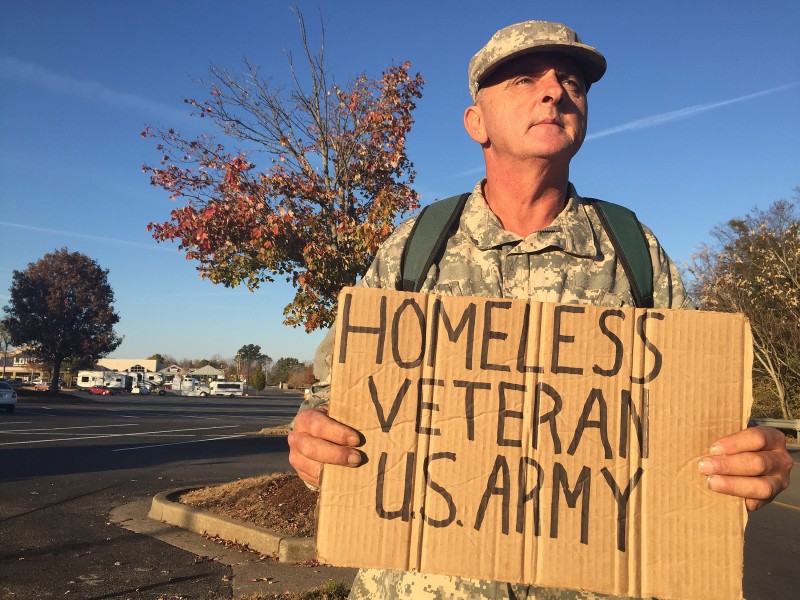By DESSISLAVA YANKOVA
Serving his country with the military was one dream a homeless West Nashville veteran often thinks of while begging at street corners before returning home to the woods.
“I wanted to make a career in the military,” Mike Hughes, 53, said. “But it didn’t work out that way.”
Instead, Pvt. Hughes spends his days standing near roadways wearing a camouflage jacket and a hat, holding a sign that says, “Homeless Veteran U.S. Army.” That’s what he did on Veterans Day, Friday.
“I don’t really get to think of anything,” he said. “I just want to get done and get out of here. I don’t like doing this.”
Hughes joined the Army in 1982 at age 18.
“I always wanted to be on tanks,” he said while standing on a street corner near the Walmart in West Nashville. “I thought it would be fun and it was.”
Hughes spent three years in the military at Fort Knox, Ky. and Fort Riley, Kan. He started working on a tank loading the main gun. Eventually, he drove a tank.
“I was planning on going to Germany,” he said. “I had already taken some German courses. But I had to get out to take care of my little brother. My little brother was more important at the time.”
Making sacrifices
His brother was 10 years old at the time. Their parents were not in a position to help.
“My mother was in rehab for alcoholism,” Hughes said. “She has been an alcoholic most of my life. My father was dying from pancreatic cancer.”
Hughes left the military and got a job to support his brother and himself. His brother hung himself 11 years later at age 21.
The veteran had worked a job, delivering plumbing supplies across Middle Tennessee for eight years when he was laid off in 2013. That year his mother also died. His father had passed soon after Hughes left the military.
The veteran said he has been trying to find a steady job but with no success. He feels few opportunities are available for a person at his age with a GED education.
Doing odd jobs here and there, and working for his landlord, he was able to afford rent for about two years after he lost his job. He eventually put everything he owned in a storage unit, which was auctioned out after he could no longer make the payments.
The veteran had to let go of a lot.
“That’s the only thing I have left,” he said, holding a small photograph he keeps inside his camouflage wallet. “That’s when I graduated from boot camp at 18.”

That’s the photo he shows to occasional drivers who stop every once and a while to scold him. They question his military service, blame him for using it “as an excuse” to ask for money and call him profanities.
Best, worst to come
On a good day, Hughes goes home with $60. On his worst day he got $7. Home is within walking distance from the Walmart in the nearby woods. Hughes’ car and truck were repossessed after he could no longer make the payments. He traded his motorcycle for a Jeep that broke down.
For the last year and three months, the veteran has lived in the woods. He has made what he describes as his “little house,” a wood frame wrapped with tarps. Tents, he said, “tore up too easy.”
The veteran has attached an emergency blanket to the ceiling of his little house to reflect sunlight, keep him warm and save him money from using his propane heater. He is not alone.
“There’re so many homeless people out here, drug addicts,” Hughes said. “Most people who are homeless, they’re either on drugs or alcohol or both. They need to go to rehab. They need to get help.”
After seeing his mother’s experience with alcohol, Hughes said he does not drink or take drugs.
He sought help from the Tennessee Department of Veterans Services several weeks ago.
“I spent the whole day there,” Hughes said. “Their computers were down, so they took my name to see what they can do to help me. They’re supposed to be getting back to me.”
Although he is not looking forward to the decreasing temperatures, November and December, the veteran said, are “the best” months because people become more generous around the holidays.
Estimates from homeless advocacy groups and the U.S. Department of Housing and Urban Development say that veterans make up between 8 and 9 percent of the homeless population, or somewhere between 40,000 and 50,000 people.
The state’s veterans department offers help with finding work, housing, education opportunities, health benefits and more, according to the agency’s website.
Learn more at tn.gov/veteran.
Operation Stand Down Tennessee also offers various services to veterans.
Learn more at osdtn.org.
Reach Dessislava Yankova at 865.384.1973. Follow her on Twitter @desspor.



















